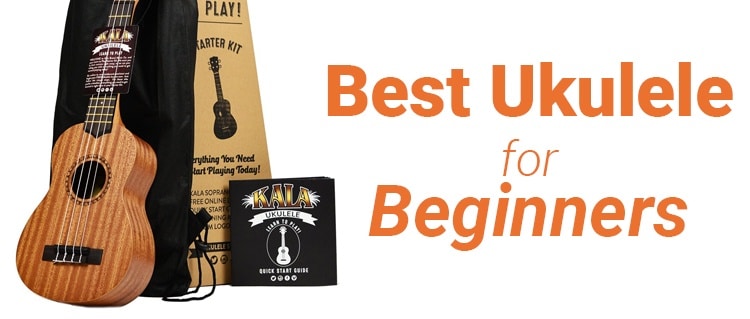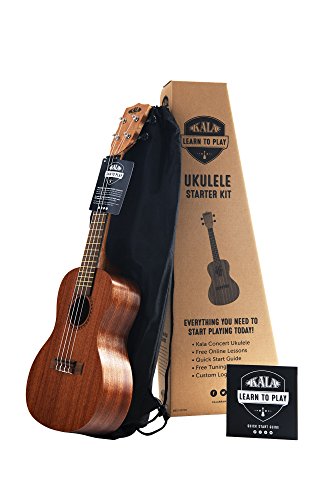
If you want to learn how to play the ukulele, buy one for beginners. The best ukulele for beginners can help you learn more efficiently and enjoyably because it is explicitly designed for beginners, with easier-to-play strings, comfortable size, and good sound quality.
Finding the best ukulele for beginners can be difficult because there are many types and brands of ukuleles on the market, and they vary significantly in terms of quality, price, and features. Some ukuleles may be too expensive or advanced for beginners, while others may be poor quality or difficult to play. It can be overwhelming for beginners to navigate all the options and choose the proper ukulele.
Fortunately, we have reviewed many ukuleles for beginners and can help you choose the one that is right for you. We have considered price, quality, playability, and customer reviews to identify the best ukuleles for beginners. You can start learning and playing the ukulele confidently and enjoy by choosing one suitable for your level and preferences.
Contents
- 5 Best Ukuleles for Beginners
- Official Kala Learn to Play Ukulele Concert Starter Kit
- Donner Concert Ukulele Beginner Mahogany 23 Inch Ukelele Starter Bundle Kit
- AKLOT Soprano Ukulele 21 Inch Solid Mahogany Ukelele
- Ranch 26-inch Professional Tenor Ukulele
- ADM Soprano Ukulele for Beginners 21 Inch Hawaiian Wood Ukelele Kit
- Ukulele Beginner Buying Guide
- How To Choose The Best Ukulele for Beginners
- Frequently Asked Questions About Ukulele for Beginners
- What size ukulele should I get?
- What type of wood is best for a beginner ukulele?
- Do I need to tune my ukulele?
- What are the best brands for beginner ukuleles?
- Do I need to learn how to read music to play the ukulele?
- What accessories do I need for my ukulele?
- What is the difference between high and low G tuning?
- Can I use a guitar tuner for my ukulele?
- How often should I change my ukulele strings?
- What are some popular songs to play on the ukulele?
- Do I need to have long fingernails to play the ukulele?
5 Best Ukuleles for Beginners
Official Kala Learn to Play Ukulele Concert Starter Kit
The Official Kala Learn to Play Ukulele Starter Kit stands out as one of the best ukuleles for beginners. Its reputation is well-deserved, thanks to its thoughtful design and features.
- Quality Craftsmanship: Crafted by Kala, a renowned ukulele brand, this kit guarantees a quality instrument. Its smooth, well-finished body ensures comfortable playability for beginners. This craftsmanship ensures a pleasant, user-friendly experience, especially for novices.
- Comprehensive Learning Resources: The kit includes a detailed instructional booklet and access to online lessons. This feature is invaluable for beginners, as it helps them quickly grasp the basics and progress in their ukulele-playing journey.
- All-in-One Package: This starter kit includes the ukulele, a tuner, a carrying bag, and extra strings. This convenience makes it perfect for beginners who want everything in one package.
This ukulele kit is most suitable for absolute beginners who want a high-quality instrument to kickstart their musical journey. It’s an excellent choice for those who appreciate the value of a comprehensive learning package and a reputable brand.
Pros:
- Quality craftsmanship
- Comprehensive learning resources
- All-in-one package
- Trusted Kala brand
- User-friendly for beginners
Cons:
- Relatively higher price for beginners
- The included tuner might need calibration
Donner Concert Ukulele Beginner Mahogany 23 Inch Ukelele Starter Bundle Kit
The Donner Concert Ukulele DUC-1 is a standout choice among ukuleles for beginners, and it’s easy to see why it’s considered one of the best.
- Rich Sound: The DUC-1 boasts a warm, resonant tone perfect for beginners. Its quality sound production adds depth and enjoyment to your playing experience.
- Comfortable Playability: This Ukulele is designed precisely and is easy to fret and strum. It’s ideal for beginners who want a smooth learning curve.
- Durability: Built with robust materials, the DUC-1 is made to withstand the rigors of learning and playing. This durability ensures long-lasting enjoyment and value.
This ukulele is perfect for those who value affordability and a great sound. It’s an excellent choice for beginners looking for an instrument that’s easy to play and will last through their learning journey.
Pros:
- Rich sound quality
- Comfortable playability
- Durable construction
- Affordable
- Excellent value for beginners
Cons:
- Basic package (tuner and case not included)
- It may require more frequent tuning initially
AKLOT Soprano Ukulele 21 Inch Solid Mahogany Ukelele
The Aklot Soprano Ukulele, with its 21-inch body crafted from solid mahogany, stands out as a top choice for beginners.
 This ukulele’s warm and resonant sound results from the solid mahogany construction. It provides a pleasant, melodic tone that makes learning and playing enjoyable.
This ukulele’s warm and resonant sound results from the solid mahogany construction. It provides a pleasant, melodic tone that makes learning and playing enjoyable.
- Solid Mahogany Build: The body ensures a vibrant sound. Beginners will appreciate the warm tones that make learning to play a joy.
- Smooth Playability: The Aklot Soprano Ukulele features precise frets and smooth nylon strings, making it easy for beginners to learn and practice without discomfort.
- Compact and Portable: Its soprano size and lightweight design make it highly portable, allowing for practice and play anywhere.
This ukulele is perfect for beginners who seek an instrument with a quality build, smooth playability, and a rich sound. It’s ideal for those who want to start their musical journey with a soprano ukulele that’s both reliable and budget-friendly.
Pros:
- Rich, warm sound
- Smooth playability
- Compact and portable
- Affordable
- Quality solid mahogany construction
Cons:
- Limited tonal range due to its size
- It may need more frequent tuning initially
Ranch 26-inch Professional Tenor Ukulele
The Ranch 26-inch Professional Tenor Ukulele is a top contender for beginner ukuleles due to its well-rounded features.
- Tenor Size: The tenor size provides a fuller, richer sound than soprano or concert ukuleles. This makes it ideal for beginners who want a more diverse tonal range.
- Mahogany Construction: Crafted with mahogany, this ukulele offers a balanced and resonant tone, giving beginners a delightful musical experience.
- Aquila Strings: Equipped with Aquila strings, renowned for their quality, this ukulele ensures stable tuning and clear, musical sound.
This tenor ukulele is suitable for beginners who appreciate a fuller sound and want to explore a broader tonal range. It’s a valuable choice for those who seek quality materials and craftsmanship in a budget-friendly package.
Pros:
- Fuller, richer sound
- Quality mahogany build
- Stable Aquila strings
- Ideal for expanding skills
- Excellent value for beginners
Cons:
- Larger sizes may be less portable
- Initial tuning may require extra attention
ADM Soprano Ukulele for Beginners 21 Inch Hawaiian Wood Ukelele Kit
The MAKA MK-21 Soprano Ukulele offers an attractive option for beginners seeking a well-rounded entry-level instrument.
- Soprano Size: Its compact size is perfect for beginners and younger players. It’s easy to handle and play, making it ideal for those new to music.
- High-Quality Materials: The MK-21 is made from mahogany and features a rosewood fingerboard, contributing to its warm and inviting sound.
- Smooth Playability: The precisely crafted frets and geared tuning pegs make it effortless for beginners to get in tune and start playing without frustration.
This ukulele is best suited for beginners looking for a compact and easily playable instrument that offers a great introduction to music.
Pros:
- Compact and beginner-friendly
- High-quality materials
- Warm and inviting sound
- Geared tuning pegs for easy tuning
- Budget-friendly
Cons:
- Limited tonal range due to its size
- It may need more frequent tuning initially
Ukulele Beginner Buying Guide
Ukulele Vs. Guitar
The difference with the guitar is that the ukulele has only four strings, and the guitar has six.
The same as the guitar: all belong to the stringed instrument, and the same way of tuning (four-string, three-string, two-string, one-string empty string sounds are four, three, four degrees).
Types of Ukulele:
The ukulele has two standard shapes: one is a guitar type, and the other is a pineapple type.
Generally, the pineapple type has better resonance, the tone is more unique, and the guitar type is more traditional, but the difference between the two is not too significant.
- Soprano: 21 inches (about 55 cm in total length), the number of strings is approximately 12-14, the string sound: GCEA (from the fourth string to the first string).
- Concert: 23 inches (about 60 cm in total length), the number of strings is approximately 15-18, string sound: GCEA. C type
- Tenor: 26 inches (about 68 cm in full length), the number of strings is approximately 15-20, string sound: GCEA. T-type
- Baritone: 30 inches (about 80 cm in total length), string sound: DGBE. B type
In particular, the B-type piano is the largest uke size for the bass, and novices are not recommended.
He may be suitable for friends who have played guitar. Because the final sound is the first four strings of the guitar, it is a small guitar, so the fingering is also a reduced version of the guitar fingering, which is different from the other three ukulele fingerings.
How To Choose The Best Ukulele for Beginners
Choosing the right Ukulele for Beginners can be overwhelming with many options. This guide will explore the essential factors to consider when selecting the best ukulele for your needs.
1. Size
Choosing the right size for the ukulele is essential as it affects the sound and playability of the instrument. Soprano, Concert, and Tenor Ukuleles are the most common sizes for beginners. Soprano Ukuleles are the smallest and have a higher pitch, while Concert and Tenor Ukuleles are slightly larger with a fuller sound.
2. Body Material
The material used for the ukulele’s body affects its sound quality and durability. Ukuleles can be made of different woods, such as mahogany, spruce, or koa. Due to its warm and mellow sound, mahogany is popular for beginners.
3. Strings
Ukuleles typically come with four strings made of either nylon or fluorocarbon. Nylon strings are easier on the fingers and provide a softer sound, while fluorocarbon strings produce a brighter and louder sound. For beginners, nylon strings are recommended for their ease of use and comfortable feel.
4. Tuners
Accurate and reliable tuners are essential for producing a clear and pleasing sound. Most Ukuleles come with geared tuners, which are easy to adjust and hold their tuning well.
5. Brand Reputation
When selecting a Ukulele, it is essential to consider the brand’s reputation for producing quality instruments. Established brands like Kala, Lanikai, and Cordoba are known for producing excellent Ukuleles for beginners.
6. Price
The price of Ukuleles can vary widely, but it is not always an indicator of quality. It is essential to find a Ukulele that fits within your budget while still meeting your needs in terms of sound and playability.
7. Playability
The playability of the ukulele refers to how easy it is to play and handle the instrument. Choosing a Ukulele with a comfortable neck and fretboard that feels good in your hands is recommended.
8. Accessories
Some Ukuleles come with additional accessories like gig bags, tuners, or instructional materials, which can be helpful for beginners.
In conclusion, choosing the best Ukulele for Beginners involves considering the size, body material, strings, tuners, brand reputation, price, playability, and accessories. Considering these factors, you can find a Ukulele that fits your needs and preferences while providing a satisfying playing experience.
Frequently Asked Questions About Ukulele for Beginners
You may have some questions if you’re a beginner looking to learn the ukulele. Here are some common questions and their answers to help you get started:
What size ukulele should I get?
The size of the ukulele you should get depends on your preference and size. Soprano ukuleles are the smallest and produce a bright sound, while concert and tenor ukuleles are slightly larger with a deeper, fuller sound. The baritone ukulele is the largest and has a lower sound, similar to a guitar.
What type of wood is best for a beginner ukulele?
Mahogany and spruce are popular woods for beginner ukuleles as they are affordable and produce a warm, pleasant sound. Additionally, laminate woods are durable and resistant to humidity changes, making them a good option for beginners.
Do I need to tune my ukulele?
Yes, tuning your ukulele regularly is important to ensure it produces the correct pitch. You can use an electronic tuner or a tuning app to help you tune your ukulele.
What are the best brands for beginner ukuleles?
Some popular brands for beginner ukuleles include Kala, Lanikai, and Oscar Schmidt. These brands offer affordable, high-quality ukuleles with good sound and durability.
Do I need to learn how to read music to play the ukulele?
No, you don’t need to learn to read music to play the ukulele. You can learn to play by reading chord diagrams or watching online tutorials.
What accessories do I need for my ukulele?
Some essential accessories for your ukulele include a gig bag or case, a tuner, extra strings, and a cleaning cloth. A strap and capo are optional accessories that enhance your playing experience.
What is the difference between high and low G tuning?
The G string is tuned to a higher octave in high G tuning, producing a brighter, more traditional ukulele sound. The G string is tuned to a lower octave in low G tuning, producing a fuller, richer sound similar to a guitar.
Can I use a guitar tuner for my ukulele?
You can use a guitar tuner for your ukulele, but it may not be as accurate as a ukulele-specific tuner. It’s recommended to use a tuner designed explicitly for ukuleles.
How often should I change my ukulele strings?
Changing your ukulele strings every 3-6 months is recommended, depending on how often you play and how much the strings are worn.
What are some popular songs to play on the ukulele?
Some popular songs to play on the ukulele include “Somewhere Over the Rainbow,” “Riptide,” “I’m Yours,” and “Can’t Help Falling in Love.”
Do I need to have long fingernails to play the ukulele?
No, you don’t need long fingernails to play the ukulele. Many players use their fingertips or short nails to strum and pick the strings.
Overall, choosing the right ukulele, tuning it correctly, and having the right accessories are essential to start your ukulele journey. With some practice and dedication, you can master this fun and versatile instrument!




